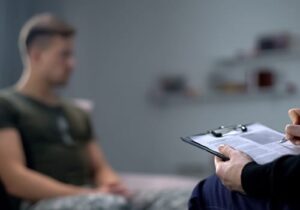 During any given year, about 12 million adults in the United States have post-traumatic stress disorder (PTSD), according to the National Center for PTSD. Many people with PTSD turn to alcohol or drugs, which can lead to a substance use disorder. Receiving dual diagnosis treatment can help break the cycle of addiction while managing PTSD symptoms. Learn more about our dual diagnosis treatment program by calling BlueCrest Recovery at 888.292.9652.
During any given year, about 12 million adults in the United States have post-traumatic stress disorder (PTSD), according to the National Center for PTSD. Many people with PTSD turn to alcohol or drugs, which can lead to a substance use disorder. Receiving dual diagnosis treatment can help break the cycle of addiction while managing PTSD symptoms. Learn more about our dual diagnosis treatment program by calling BlueCrest Recovery at 888.292.9652.
What Is PTSD?
Post-traumatic stress disorder is a condition that a traumatic event triggers, whether you experience it or witness it. Most people go through at least one traumatic event in their lives, but those who develop PTSD struggle to get past the trauma.
There are four different types of PTSD symptoms that may affect you: intrusive memories, negative changes in mood and thinking, avoidance, and changes in emotional and physical reactions.
Intrusive Memories
Symptoms of intrusive memories include:
- Upsetting dreams about the event
- Recurring and unwanted memories of the event
- Flashbacks
- Emotional distress related to triggering thoughts
Negative Thoughts and Mood
Symptoms of negative changes in moods and thinking can include:
- Hopelessness about the future
- Memory problems
- Negative thoughts about yourself and the future
- Trouble maintaining close relationships
- Feeling detached from others
- Lack of interest in activities you enjoyed
- Feeling emotionally numb
- Avoidance
- Symptoms of avoidance are:
- Avoiding things that remind you of the event
- Avoiding thinking about the event
Emotional and Physical Reactions
The changes in physical and emotional reactions are:
- Always being on guard
- Sleeping problems
- Concentration problems
- Angry outbursts and aggression problems
- Powerful feelings of guilt or shame
- Self-destructive behavior
In order to get a diagnosis of PTSD, the symptoms have to impact your life and must be present for at least one month.
Because of how overwhelming the symptoms of PTSD can be, many people self-medicate with drugs or alcohol. Addiction can make PTSD symptoms worse, even though it may seem to alleviate them at first.
If you have a substance use disorder and PTSD, the best thing you can do is turn to a PTSD treatment program that offers treatments for co-occurring disorders.
PTSD and Addiction Treatment in New Jersey
At BlueCrest Recovery Center in New Jersey, we provide specialized PTSD and addiction treatment programs to support your recovery journey.
Partial Care Program
We offer a partial care PTSD treatment program that can address the challenges you face by offering individualized plans. Our partial care PTSD therapy program provides structure and safety for people just beginning their recovery.
Our evidence-based treatment options include 12-step programs, cognitive-behavioral and dialectical behavior therapies, group therapy sessions, family counseling, and more.
Behavioral therapies are the best options for the treatment of both PTSD and addiction. You can get the help you need for both conditions at once.
Intensive Outpatient Program
We also offer an intensive outpatient PTSD counseling program that gives you a bit more freedom but maintains the structure you need to battle substance use disorders and PTSD.
Our intensive outpatient programs can be three-day or five-day plans, depending on your individual needs. We have day and evening sessions to accommodate fluctuating work or childcare needs. We also provide 12-step programs to encourage people to stick with their recovery.
Outpatient Program
At BlueCrest Recovery, the next step of care is to turn to an outpatient PTSD therapy program. It can allow you to get back to your daily life while still having access to medication management and psychological and psychiatric care.
Our outpatient programs also provide relapse prevention services and guidance to help you maintain your sobriety.
Turn to BlueCrest Recovery for Effective PTSD Treatment in New Jersey
You do not have to struggle with PTSD and addiction. By turning to treatment centers that can offer dual-diagnosis treatment programs, you can get the help you deserve. Contact BlueCrest Recovery today at 888.292.9652 to start healing.





